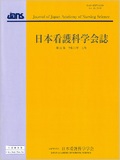Japanese
English
- 販売していません
- Abstract 文献概要
- 参考文献 Reference
要旨
目的:生存の限界といわれる子どもへの医療選択において,母親が代理意思決定をどのように経験しているのかについて記述する.
方法:母親ひとりに非構造化インタビューを行い,そのデータを現象学的方法で記述した.
結果:母親が語る代理意思決定の経験は,「主体の置き去り」と「主体の取り戻し」の二つのテーマに分けられた.子どもは,医学的所見でカテゴリー化されることにより主体を剥奪され,母親は医療者の望む「お母さん」を演じることにより主体を覆い隠していった.しかし,母親は医療者たちが支援の一環として創る世界に巻き込まれることによって,次第にその世界を基盤とし,子どもと自身の主体を取り戻していった.
結論:母性を絶対視した支援は,母親からの支援要請を断絶させたが,一方でその支援が時間の経過とともに母親の視点を変えるきっかけとなっていった.医療者は時に内観しつつ,支援を必要とする人々の内実に関心を向け続けることの大切さが示唆された.
Aim: This study aimed to describe the experience of proxy decision-making among mothers of infants born at the limits of viability in the medical context.
Methods: Data were collected through unstructured interviews and analyzed using phenomenological methods.
Results: The mother's proxy decision-making experience was divided into two themes: “leaving subject” and “regaining subject.” The child was deprived of subject through being categorized by medical findings and the mother concealed her actual self by acting as the “mother” desired by the patient care team. However, as the mother developed her support by becoming involved in the world created by the patient care team, she gradually regained her child and her own subject within that world.
Conclusion: Offering support with a full view of motherhood limited the mother's requests for support, but also provided an opportunity to change mother's viewpoint over time. It was suggested that it is important for the patient care team to be introspective and consider those in need.
Copyright © 2021, Japan Academy of Nursing Science. All rights reserved.


